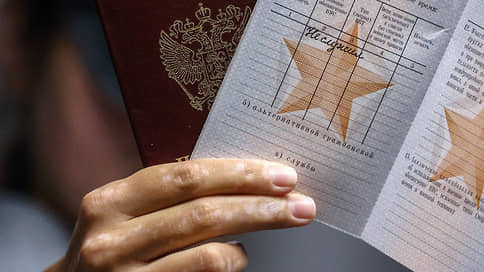Russians are offered to be deprived of acquired citizenship for evading military registration
[ad_1]

State Duma Deputy Mikhail Matveev (KPRF) on Monday submitted to the lower house a bill on deprivation of acquired Russian citizenship for evading military registration, military duty or mobilization. According to the communist, “new Russians” often avoid the corresponding obligations, while their fulfillment during the period of a special military operation (SVO) acquires “special relevance.” The deputies are skeptical about the initiative of their colleague, recalling the already existing measures of influence on draft dodgers. But the expert notes that pressure on migrants has recently become a noticeable political trend.
Bill Mikhail Matveev provides for an amendment to the law “On Citizenship”. Expanded this summer, the list of grounds for deprivation of acquired citizenship, the communist proposes to supplement with a clause on the commission of actions “expressed in the evasion of a person … from military duty, mobilization, including violation of the terms of military registration.” In an explanatory note, Mr. Matveev pointed out that natives of foreign countries who received a Russian passport “often evade military registration”, while receiving social benefits. The need to perform military duty is especially relevant during the NVO period, the deputy added.
Recall that in August the Presidential Council for Human Rights proposed to synchronize the issuance of Russian passports and the registration of new citizens for military registration. At the same time, the media reported that in different regions “new Russians” were being massively brought to military registration and enlistment offices for this purpose – law enforcement officers carried out similar raids, for example, in St. Petersburg and Chelyabinsk.
Mikhail Matveev told Kommersant that he did not discuss his initiative with the leadership of the faction and the Duma, but “announced” it, and a number of colleagues “received the concept positively.”
He decided to introduce the bill on his own partly because of the vacation period, during which the faction does not meet.
In addition, the deputy does not consider the bill “party in its ideology” and hopes for the support of all factions. “This initiative is so logical and relevant that it’s hard for me to see the arguments that any of my colleagues may have against it,” the communist admitted. Russians were mobilized and sent to the NVO zone, and at the same time hundreds of thousands of new settlers came to Russia and received Russian citizenship here. A significant part of society has a hypothesis that some not entirely fair process is taking place when our people are sent to the front, and their jobs are occupied by people from Central Asia and the Caucasus, who bring their families here and begin to enjoy all the social and other rights of a citizen of the Russian Federation, not while carrying out duties, including military.
Responsible for this bill, most likely, will be the Duma Committee on CIS Affairs and Relations with Compatriots. His first deputy chairman, Konstantin Zatulin (United Russia), however, does not welcome the initiative. “Deputy Matveev is trying to correct evil with the help of evil,” United Russia told Kommersant. “At the same time, he follows the path of dividing Russian citizens into those who received citizenship by birth and those who acquired it. I am categorically opposed to this.” Mr. Zatulin recalled the already existing criminal liability for evaders and urged “not to engage in games with citizenship”: “Will we deprive all criminals of citizenship? Then why is there a system of execution of punishments, all the work to re-educate criminals?” In addition, there is a risk that the “angry” ex-citizen, upon returning to his homeland, may end up in the ranks of extremist anti-Russian organizations, the deputy added: “I will not make any predictions regarding the adoption of this law, but I will oppose “.
Interviewed by Kommersant, colleagues of Mikhail Matveev in the Duma opposition also assessed his idea with skepticism. Yaroslav Nilov, deputy head of the LDPR faction, stressed that all citizens are responsible for non-compliance with laws and “the mechanisms aimed at enforcing the norms on military service are quite tough”: “But immediately take and deprive of citizenship? It’s hard for me to imagine.” He also recalled that ethnic Russians are also applying for citizenship.
“The question should be put differently: not to deprive someone of citizenship if he did not serve or shirked, and not to give citizenship without serving in the army,” said Dmitry Gusev, first deputy head of the Just Russia – For Truth faction.
At the same time, Spravoross is sure that citizens of the new regions should not be affected by the relevant initiatives.
The president of the Petersburg Politics Foundation, Mikhail Vinogradov, notes that many actors have recently abandoned the taboo on using the nationalist theme: the fact that the Motherland bloc was once removed from the elections, under the pretext of wartime, has become a completely legal argument even for HRC. “In general, the lower the probability of mobilization, the greater the pressure on migrants. Although this jeopardizes our relations with the countries of Central Asia, which are sensitive to anti-migration rhetoric and have several times pointed out high-profile excesses to Moscow, ”concludes the political scientist.
[ad_2]
Source link








